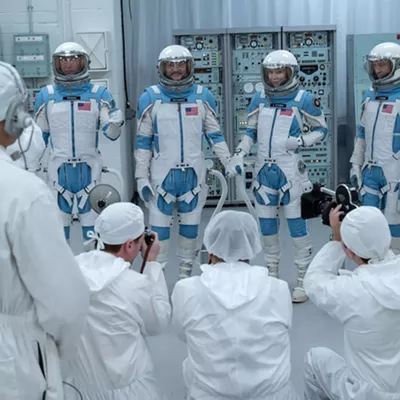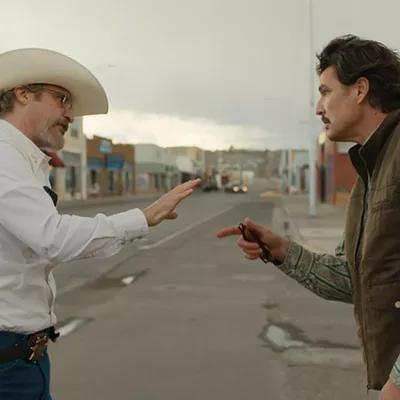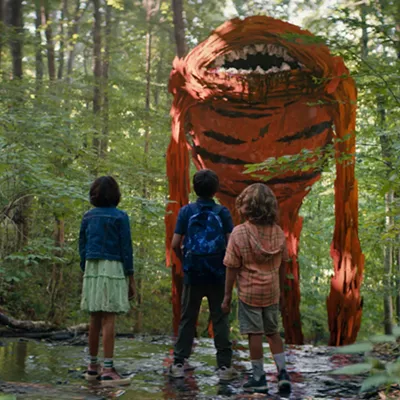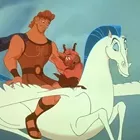It has turned into something akin to a punchline every time a filmmaker or Disney+ show-runner associated with a Marvel Comics property tries to pitch its roots in a classic genre. Captain America: The Winter Soldier is a political thriller! Thor is Shakespeare among the gods! Spider-Man: Homecoming is a John Hughes comedy! The intentions are good, I'm sure, to weave such influences into the story, but when it comes right down to it, the Marvel-ness of a Marvel story is going to dominate. You can't pour a drop of 30-year-old single-malt scotch into a bottle of Coke and pretend it's a high-end cocktail.
Black Widow is a bit stranger in this regard, in the sense that the movie arriving in theaters and on Disney+ Premiere Access on Friday feels like an attempt to pour two radically different flavors into that fizzy Marvel formula. On the one hand, it's quite clearly aiming for the globe-trotting highs of a vintage James Bond thriller; on the other hand, it wants to delve into the dysfunctional family dynamics of a Chekhov play. And it's hard to envision a scenario in which those flavors could all work together while still allowing Black Widow herself a showcase.
Not surprisingly to anyone who saw Natasha Romanoff (Scarlett Johansson) die in Avengers: Endgame, this is almost entirely a flashback story, set primarily in the time between Captain America: Civil War and Avengers: Infinity War when Natasha was a fugitive from the government. A prologue to that main story shows her as a child in 1990s Ohio, an orphan being raised along with a younger "sister" by two Russian spies, Alexei (David Harbour) and Melina (Rachel Weisz) to promote the illusion of a normal American family. More than 20 years later, Natasha and that adopted sister, Yelena (Florence Pugh), are reunited in an attempt to finally destroy the Russian "Black Widow" training program that turned both of them into elite killers.
Black Widow takes off once Natasha and Yelena are working together, thanks largely to the brittle energy Pugh brings to her performance. She captures the jealousy of a younger sibling who's watched Natasha become a famous Avenger, and the anger at Natasha never once trying to find her, all while poking at the way Natasha always strikes the three-point "hero pose." It's even more entertaining when Harbour joins the family reunion as a doughy version of the Soviet-era super-soldier Red Guardian, slowly realizing he was much more concerned with trying to return to his (largely imagined) glory days than with protecting his girls from harm.
There's plenty of potential in watching Natasha and Yelena work through their abandonment issues while still trying to kick ass, except the ass-kicking part was always going to take center stage. Here, director Cate Shortland and the screenwriting team — with a story co-credited to WandaVision creator Jac Schaeffer and screenplay by Agent Carter writer Eric Pearson — are clearly aiming for a vibe reminiscent of late-1970s Bond films, emphasized when we get a shot of Natasha watching Moonraker on television. From the title cards prominently emphasizing locations like "MOROCCO" and "BUDAPEST," to the pairing of a big villain (Ray Winstone) with a silent, nearly unstoppable henchman called the Taskmaster, to the car chases and free-fall-from-low-orbit set pieces, it all feels like something Roger Moore could have starred in. And there's some fun action along the way, even if it still feels like nobody involved in modern blockbuster filmmaking understands how to edit a hand-to-hand fight sequence anymore.
The awkwardness of Black Widow is that somewhere in all of that, we mostly lose the idea that this is a "stand-alone" Black Widow movie. No matter how many hints previous MCU movies dropped regarding Natasha's mysterious past, the character was always sort of an afterthought among her far-more-powerful male Avengers teammates. Johansson tries gamely to wrestle some emotion from the story arc here, yet she's still overshadowed by her co-stars, and doesn't get enough opportunity to play the dysfunctional family emotions before the James Bond stuff has to reassert itself. Black Widow ends up trying to throw too many things into a story that ultimately needs to serve the MCU "big picture," including setting up Pugh for appearances in other films and series. While all those flavors fight for attention, Natasha is just left to be a woman in a form-fitting bodysuit, striking that three-point hero pose. ♦




















